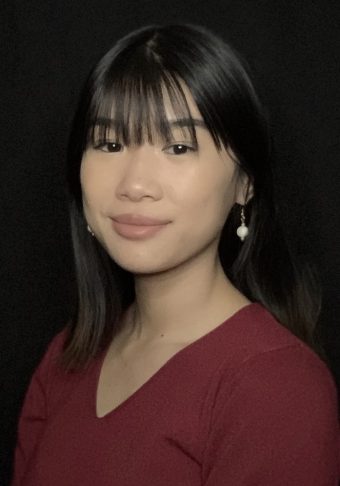April 12, 2023
Contact: Shea Stewart, bsheastewart@missouri.edu
Show Me Research Week is April 17 through 21. The week showcases how University of Missouri students and postdoctoral fellows are becoming the next generation of creators, innovators, problem solvers and thinkers as they seek new knowledge and tackle challenges affecting Missouri and beyond. The week involves professional development sessions, a visual arts and design showcase, keynote speakers, research and creative achievement forums, student presentations and more.
Among the nearly 500 MU students set to showcase their research and creative activities are psychological sciences majors Jocelyn Lamore and Makayla Pollock. Learn more about their research and what being involved in Show Me Research Week means to them.

Mother and child research
Both Lamore and Pollock are researchers in Ashley Groh’s Family and Child Development Laboratory, which focuses on the developmental origins and significance of a child’s early relationship with parents and the impact that it has on social and emotional development.
“I think it’s critical for faculty to actively engage undergraduates in research and for students to take advantage of these opportunities early in their career,” said Groh, an associate professor of psychological sciences. “Show Me Research Week is an opportunity for MU students such as Jocelyn and Makayla to show how their involvement in research has helped shape their education and prepared them for future endeavors. By becoming involved early in research, undergraduates will gain a better idea of their research interests and gain critical research skills that will help them later.”
Lamore’s research explores the role of partner presence in mothers' neural responses to infant crying, and its key findings could encourage further research on support for mothers during times of infant distress, which also can reflect implications for child outcomes.
“Jocelyn’s project addresses an important gap in parenting research,” Groh said. “We know that how mothers respond to their infant’s distress is important for infant social and emotional development. However, research has only considered mothers responding when they are alone. Jocelyn’s project will test for the first time whether partner presence supports the mothers’ brain responding to infant distress in ways expected to support parenting behavior and infant development.”
Calling Lamore a “problem-solver,” Groh noted that Lamore demonstrates resilience, resourcefulness and persistence as a researcher, which are critical skills for scientists because staying motivated and solving problems despite challenges are important to see a research project to completion.
“I wanted to be a part of Show Me Research Week because it’s a great opportunity to showcase my findings and to add to the broader understanding of parent/caregiving in the context of a mother’s response to infant distress,” said Lamore, a junior from Springfield. “I’m also looking forward to expanding my presentation skills, gaining valuable feedback on my research and meeting other researchers across campus. I hope to walk away knowing more than I did.”

Getting involved
Pollock, a senior from Omaha, Nebraska, will present her research into the role of race in the neural processing of infant emotional cues. Her findings focus on young adults’ brain activity when viewing infants and adults of different races displaying various facial expressions.
“I knew I wanted to become more active within my major, and undergraduate research was a perfect opportunity to do that,” Pollock said. “I was first introduced to undergraduate research by the McNair Scholars’ Discover Program, and it really motivated me to get more involved.
“My advice to other students is to reach out to professors who are conducting research you're interested in. Everyone wants you to succeed, and there are many resources around campus to help you along the way.”
Pollock’s research takes a significant step toward addressing systematic bias in research on the maternal brain, Groh said. Pollock’s study is the first to include a balanced sample of white and Black individuals and to comprise stimuli of infants from different ethnic and racial backgrounds to evaluate whether individual and infant backgrounds impact the brain responding to infant emotional expressions.
“Makayla is extremely self-motivated,” Groh said. “She has completed two independent projects in my lab from start to finish and has presented findings at institutional, regional and international conferences. Makayla sets high goals for herself and works hard to achieve them.”
Lamore and Pollock are just two of the excellent MU students presenting their work during Show Me Research Week, as the event celebrates the university’s thriving student and postdoctoral fellow research and creative activity. Visit Seven Things to Know About Show Me Research Week to learn more about the week.



